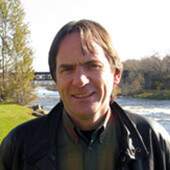Global Ethics Forum TV Show
"Peace-building is literally about building now," says Dalby. "It's about constructing buildings that don't need large quantities of energy, both because of climate change and so that they are not dependent on supplies from the other side of the planet."
Professor Dalby is with us today to speak on the issue of environment and security.
Welcome, Simon. Good to have you with us at the Carnegie Council.
SIMON DALBY: Thank you for the invitation. It's good to be here.
JOHN TESSITORE: Simon, you write and teach about political geography, geopolitics, and globalization. You also have a particular interest in the environment and geopolitics and what's known as environmental security. You have even written a book by that very title. I know you have a forthcoming book, coming out this summer, I believe, entitled Security and Environmental Change.
Let me begin with an admittedly broad question: What does an emphasis on environmental security mean for this tired old planet of ours in general, and for state sovereignty in particular?
SIMON DALBY: The debate about environmental security is just that. Mostly, it's a debate. How is it that we think about the environment when we think about security?
Traditionally, security was understood in relationship to sovereignty. It was about threats that came across borders. It was about keeping the bad guys out. It was about maintaining our sovereignty against a bunch of external threats. It was about, particularly, preparing to deal with military threats that came from somewhere out there, in ways that would threaten us in here.
JOHN TESSITORE: And, of course, those haven't gone away.
SIMON DALBY: Those issues haven't gone away. At the end of the Cold War, the real focus was on environmental issues in various parts of the world. Now that the Russians are no longer supposedly threatening the West, there are all sorts of environmental issues that are serious enough to be thought about as threats.
JOHN TESSITORE: For example?
SIMON DALBY: Certainly in terms of the ozone hole at that stage, certainly in terms of great worries about the burning of the Brazilian rainforest, worries about various species going extinct, and so on. Many of those issues were on the agenda, principally focused on by international environmentalists.
But some of the folks in the military, too, thought, if these things are actually serious enough, should we consider them as security problems? Are they the kinds of issues that are a big enough threat to be a priority for states, and hence a matter for national security?
At the same time, there were a lot of people talking about this and thinking, actually, it's not individual states that are being threatened; it's lots of people in different places—particularly, with things like the ozone hole, entire species close to the Poles that were vulnerable to the ultraviolet rays getting through to the surface, both of the land and of the oceans.
So the debate sort of started there: What kinds of threats? How serious are they? What is the appropriate institutional response?
It led to such things, amongst others, as the Earth Summit in Rio in 1992, where, in fact, most of these issues weren't talked about in terms of security.
JOHN TESSITORE: Were not, you say?
SIMON DALBY: Were not. As these issues were taken up in Rio, they weren't understood, most of the time, as security issues—not least because many folks from the Southern countries of the world simply didn't see that this connected to traditional notions of security at all.
It was a pressing matter of development, as they saw it, a pressing matter of ensuring that development was done in a way that, if it was environmentally sustainable, certainly made sure that they got some of the benefits. Hence, the connection with security didn't seem to be very obvious to some of them there.
But the debate didn't go away. It's back with a vengeance recently, particularly with climate change.
JOHN TESSITORE: Is it a North-South issue, or is it really, truly a global issue at this point?
SIMON DALBY: This depends on who you talk to. In many ways, it's a North-South issue, not least because folks in the South figure Northerners got rich despoiling the environment, churning out huge quantities of carbon dioxide. Northerners need to actually fix this thing, as they see it, because it isn't Southern states that are causing climate change. They may be beginning to cause a bit of it now, but the history is that simply the Northern states have done that.
JOHN TESSITORE: But that's the old development argument.
SIMON DALBY: And the old development argument has not gone away.
JOHN TESSITORE: You are giving me another side to this. Is that the dark side of the environmental security issue?
SIMON DALBY: No, I don't think it's the dark side at all. I think it's now the unavoidable context in which we have to talk about this issue.
Insofar as the climate is about global issues, the responsibility lies with those who made the mess to clean it up. Frankly, in ethical terms, this is kindergarten ethics: You make the mess, you clean it up.
Many people around the world are making precisely this argument now, because it is a global issue insofar as we are changing the atmosphere we all breathe. But some of us are changing it a lot more than others, and therefore the distributional questions are unavoidable in terms of thinking about these issues.
JOHN TESSITORE: You went back to the world summit in 1992. I'm going to push you back a little bit further, to the 1980s, when we had something called the Brundtland Commission and its report, which maybe is the granddaddy by this point of this awareness movement. Have the issues changed? Have they become more acute? Or have people just woken up and started to realize that they can't be ignored anymore?
SIMON DALBY: The security dimension in the Brundtland Commission is particularly interesting. The assumption was, in the 1980s, that resource scarcities would cause conflict.
JOHN TESSITORE: We would be fighting over fresh water.
SIMON DALBY: We would be fighting over fresh water. Well, actually, we are not fighting over fresh water. Interestingly enough, when you actually go back through history and you look for the wars fought over water, they don't happen. Everybody assumes they happen, but the historical record is very clear that they just aren't there. There's lots of small-scale violence and skullduggery.
JOHN TESSITORE: Range wars in the Old West.
SIMON DALBY: Range wars in the Old West, exactly, that kind of thing. But full-scale interstate warfare just doesn't seem to happen over water, for lots of interesting reasons.
In the early 1990s, following on from the Brundtland Commission report, Thomas Homer-Dixon, in particular, another Canadian, simply posed the question: Where does this happen? Where is the historical record about scarcity of resources causing warfare? He thought it should be easy enough to figure out a few obvious episodes of this and then do some good old-fashioned empirical social science research and go out and look and figure out how this all worked.
Surprise, surprise! What didn't seem to happen was large-scale violence that could easily be connected with resource scarcities. Yes, you can get connections between resource scarcity and violence. Most of it is small-scale. Most of it is fairly local. It usually relates much more to questions of institutions that aren't working, or the sheer nonexistence of institutions, than it does to any particular question of environmental scarcity.
JOHN TESSITORE: Example?
SIMON DALBY: Some of Homer-Dixon's examples included cases in India and various other places where there simply wasn't any way of resolving absentee landlord-tenant relationships, for instance. There was lots of abandoned land, but at the same time, lots of people that were in desperate need of land on which to grow food. One of his case studies was in India, looking at these kinds of issues. If there had been good institutional arrangements for resolving conflict, then environment wouldn't have been an issue, because it would have been resolved.
Much of his argument, then, was that, in fact, while it might appear that scarcity is a problem, actually scarcity is only a problem if you haven't got it together to handle the consequences of it.
So it comes back to questions of institutions. It comes back to the institution of justice, above all else, in terms of dealing with marginal peoples who are in need of sustenance and can't get it.
That kind of violence is what he ended up focusing on, which is slightly different from the Malthusian pessimisms of starving mobs causing security problems, which is what the assumptions had been back in the 1980s.
JOHN TESSITORE: So what's the approach now? Is it national security, international security, or human security? How is the community that is looking at this seeking to address it?
SIMON DALBY: All those things are in play, and each discourse is looking at the problem in a slightly different way.
JOHN TESSITORE: What's your way?
SIMON DALBY: My way is actually looking at bits and pieces of all of these bits and pieces. And that is the challenging part, intellectually. But I like an intellectual challenge. This is one of the reasons I have been trying to figure out how to put these pieces together. In that sense, I tend to be the concepts guy and the synthesizer, rather than the empirical field worker.
JOHN TESSITORE: What has it taken you to right now? What's the latest statement from Simon Dalby on this?
SIMON DALBY: The new book that will be out, as you kindly mentioned, in June 2009 states in the first chapter that if we look back at scares about Malthus and resources and the limits-to-growth debate in the early 1970s, clearly people have been worried about the environment in one form or another for a very long time.
The second chapter says that it's not actually a good fit to conventional notions of national security. Not least because the conventional assumptions about security are that the threats are out there, whereas, in fact, most of the contemporary environmental issues are actually being caused by us, not them, which means that security has to be thought about far more carefully.
But what is the environmental context with which we need to worry now? Actually, there is a long history to environmental change, rapidly accelerating over the last couple of centuries as globalization and the industrial society has expanded to pull in commodities from all over the planet and put fossil-fuel byproducts, like carbon dioxide, into the atmosphere in ever-increasingly large amounts, which is really beginning to destabilize the atmosphere. That history needs to be looked at first.
Secondly, what does it all mean scientifically? The global-change scientists have now come up with this term, the "anthropocene," which is the new geological era in which we live, trying to emphasize that we are actually changing the basic parameters of our planet's biosphere, mostly inadvertently, but that is what we are doing. We have also in the process become an urban species. This is sort of Chapter 5 in my book, which asks, who is vulnerable where, and what does this mean for them?
JOHN TESSITORE: The great cities.
SIMON DALBY: The big cities, particularly the huge, sprawling slums of the Global South, where billions of people are now living and are vulnerable because of the context they are in. But as Katrina reminded all people in North America, we too in this part of the world are vulnerable but, to a very substantial extent now, because the infrastructure is vulnerable to increasingly severe storms.
JOHN TESSITORE: What infrastructure?
SIMON DALBY: The roads, the supply lines.
JOHN TESSITORE: Literally, the physical infrastructure?
SIMON DALBY: The physical infrastructure. That's what Katrina told us. We need to think very carefully about being able to get the food and the trucks through the highways to the cities. Those kinds of issues are increasingly a part of what we need to think very carefully about in terms of security.
In terms of human security, it's now partly engineering security. It's literally about recognizing that people are vulnerable to these hazards, in the new, increasingly artificial circumstances, both directly in terms of the bridges and the cellphone towers and the communications infrastructure to make sure the grocery trucks get through.
But also, as climate change kicks in with bigger storms and more severe droughts, all of those things are going to put more strain on the infrastructure, the supply systems, and the food-growing and distribution systems that we all depend on. So we need to look at building those systems with resilience planned into them so that they are actually able to tolerate the disruptions that are coming.
The real trick is to do all of that while trying to reduce the amount of energy that goes into making them and maintaining them, because if we are going to deal with the big issues of climate change and the disruptions that are coming, we need to be slowing down those disruptions.
JOHN TESSITORE: So the nexus is with energy.
SIMON DALBY: Energy is a crucial part of it, but also building things that don't need to use energy in the first place is crucial. The Germans are seriously thinking about houses that don't have furnaces, despite German winters. The British are talking about the same thing. They are thinking about building codes and such things.
That's the heart of the debate about security now, although we haven't yet begun to think about security in things like building codes and industrial design and infrastructure that is capable of moving people and things around without using huge quantities of fossil fuels.
That's the challenge for the future. We are only beginning to think about energy security directly connecting to climate security. But we have to put those connections in place, and the sooner, the better.
JOHN TESSITORE: You talk about the future. Let me take you to the past a little bit. I'll show my age by remembering when we used to talk about ecology and the ecological movement back in the 1970s. As early as then, we were talking about planting trees, protecting fish species, Georges Bank, overfishing, over-lobstering, et cetera.
Maybe these seem like quaint little issues today, because the other issues seem so much greater. But are those still around?
SIMON DALBY: Those issues are very much still around. The necessity of dealing with all of them is being made more complicated because of the bigger ecological changes that are coming relating to climate change.
The acidification of the oceans, the warming of the oceans, is making fishing more difficult. The fish are migrating along the coasts of most of the planet now as the currents warm up and such things happen. We need to think about how you maintain fish stocks when it's not quite predictable how they are going to migrate.
How we think seriously about major reforestation is important, but we also need to think very carefully about what kinds of trees we are going to plant. If the climate is changing, planting something that has grown very well in a particular location for the last couple of hundred years may not be the right thing to plant now. We have to think about whether or not the trees, when they're mature 80 or 100 years from now, will thrive in whatever the new climate conditions are 80 or 100 years down the road.
JOHN TESSITORE: Are there people who are thinking about that right now?
SIMON DALBY: Forestry people are worried about this. Probably the simple answer is, if in doubt, plant a mix of trees and let nature decide which ones are going to do best. In some cases, we may need to do that. But on the other hand, if the forest company owns the plot of land, they are trying to figure out how to maximize their forest yield, so they want to grow just one species because they will get more money out of it. All of those kinds of issues are very complicated.
JOHN TESSITORE: We know the forestry people are thinking about it. We know Simon Dalby is thinking about it. Who else is thinking about? Are the policymakers thinking about this, or are they thinking about it enough?
SIMON DALBY: I don't think they are thinking about it nearly enough. Ironically, the current global economic troubles, in some ways, do give us an opportunity to think. But if we are going to have to think quickly about this, because if we are going to stimulate economies across the world by infrastructure spending, let's make sure we spend it on infrastructure that is smart in terms of being both resilient and low-energy.
JOHN TESSITORE: Is anybody preaching this to the current administration? Are they getting this message?
SIMON DALBY: I get a sense that they are.
JOHN TESSITORE: I say the U.S. administration, but there are many administrations that have to do this.
SIMON DALBY: Probably the U.S. administration is doing better than the current Canadian government. I do come from Canada. But that's another story. The whole slogan for the Obama administration in Washington is about "repowering America." That's sort of the right slogan, the right focus in terms of thinking about solar panels, thinking about how it is that you build an energy infrastructure that isn't dependent on shipping petroleum from the far corners of the world, but is also very explicitly upgrading the infrastructure right here at the same time.
Those kinds of connections are being made. Hopefully they will be made a whole lot more quickly in the coming years.
JOHN TESSITORE: What are the multilateral approaches? What institutions are working on this, or at least acknowledging and attempting to address it?
SIMON DALBY: The big one, of course, is the post-Kyoto negotiations that are starting up at the moment, a big meeting coming in Copenhagen at the end of 2009. That is talking about emissions of carbon dioxide, specifically trying to reduce greenhouse gases.
One of the things that in the last generation we haven't been able to do is industrial planning, because this was supposed to be socialist and markets were supposed to solve all our problems.
Well, it's very clear in the last year or two that markets are not solving all our problems. Decisions as to what to produce in the circumstances that we are facing can't be left entirely to markets.
We need to set a series of market incentives in place to make sure that we do build solar panels and windmills, and perhaps we should build many fewer SUVs. If you are going to bail out the Big Three auto companies, make sure that they are building cars that are environmentally friendly.
But why not take a few of those auto-production plants over and start a crash-production system on windmills and solar panels, and structure the regulatory incentives so that the utilities are encouraged to move in those kinds of directions?
The Germans have been doing this. They have been figuring out that building a solar industry is the smart, intelligent thing to do for the future. They are taking the lead on wind. They picked up the running from the Danes there.
Again, this is an industrial strategy. It's an intelligent thought about, literally, what we are making.
I like to say that peace-building is literally about building now. It is about building buildings that don't need large quantities of energy, both if we get major disruptions of the climate and also so that they are not dependent on supplies coming from the other side of the planet—oil, petroleum, coal, or whatever. It means that in a disaster those buildings are not dependent on energy. They are resilient in the sense that they can withstand whatever the weather throws at them. But they are also then not tying up large numbers of resources to ship them and wasting the resources that are causing us greenhouse gas emissions.
Those are the kinds of things we have to think about.
JOHN TESSITORE: Let me come full-circle. Let me focus right back on the word "security" again.
You said that the history is such that we really don't have examples of interstate warfare over resources. But at the same time, many of the things that you said suggest that we might be inching closer to it, as these scarcities become critical.
Certainly there are some who will argue that that has a great deal to do with our invasion of Iraq.
SIMON DALBY: Absolutely. Petroleum is the big exception to most of the rules when it comes to the resource issues. On the other hand, ironically, we are in an extraordinarily bizarre situation.
JOHN TESSITORE: How so?
SIMON DALBY: Our climate-change problem is precisely because we have far too much petroleum.
The problem is, we have been burning it up and not paying attention to what comes next. If we had had a lot less petroleum, if it had been much scarcer, we would have figured out how to use solar panels.
JOHN TESSITORE: We might have used oil wisely.
SIMON DALBY: We would probably have used it a lot more wisely. It's the perfect chemical feedstock. It's the perfect feedstock for industry in all sorts of ways. And what do we do? We burn it.
This is not a sensible way to run a small planet. It really isn't.
JOHN TESSITORE: I'm going to finish by asking you a question on behalf of the many students who may be watching and listening and have an interest in this area. It, of course, is an area that is getting increasing interest all the time.
What recommendations do you have for them as young scholars? What might you refer them to? Any particular references, any particular books or texts you might want to recommend?
SIMON DALBY: If you are young and you are worried about these issues, you have good reason to worry about them, but not to panic. The crucial message here is, what we do next matters.
What we do in the next decade and the decade after that makes a big difference in terms of how societies respond to climate change. If we don't get our act together in the next 20 years or so—and it would be real nice to get it together an awful lot faster than that—then there are potentials for some situations where war might break out as a result.
If you want to read one book, I would suggest—if you will forgive a Canadian source—Gwynne Dyer, who wrote a little book recently, Climate Wars, where he sets out a whole series of scenarios of how things might go wrong. It's very readable. It lays out practical scientific things, practical political things that need to be done, while at the same time warning that if we don't do some of these things, some of the worst scenarios of climate change causing war might play out.
It really makes it very clear why panic isn't appropriate, but certainly shifting how we think about security is now undoubtedly important and needs to be got on with.
Focusing on those kinds of issues and how to get both the public and the policymakers focused on some of these issues is the priority for the current generation of students interested in security.
JOHN TESSITORE: I also want to suggest that they read your forthcoming book, Security and Environmental Change. We want to thank you for being here with us today, Simon. It has been a real pleasure.
SIMON DALBY: Thank you very much.



